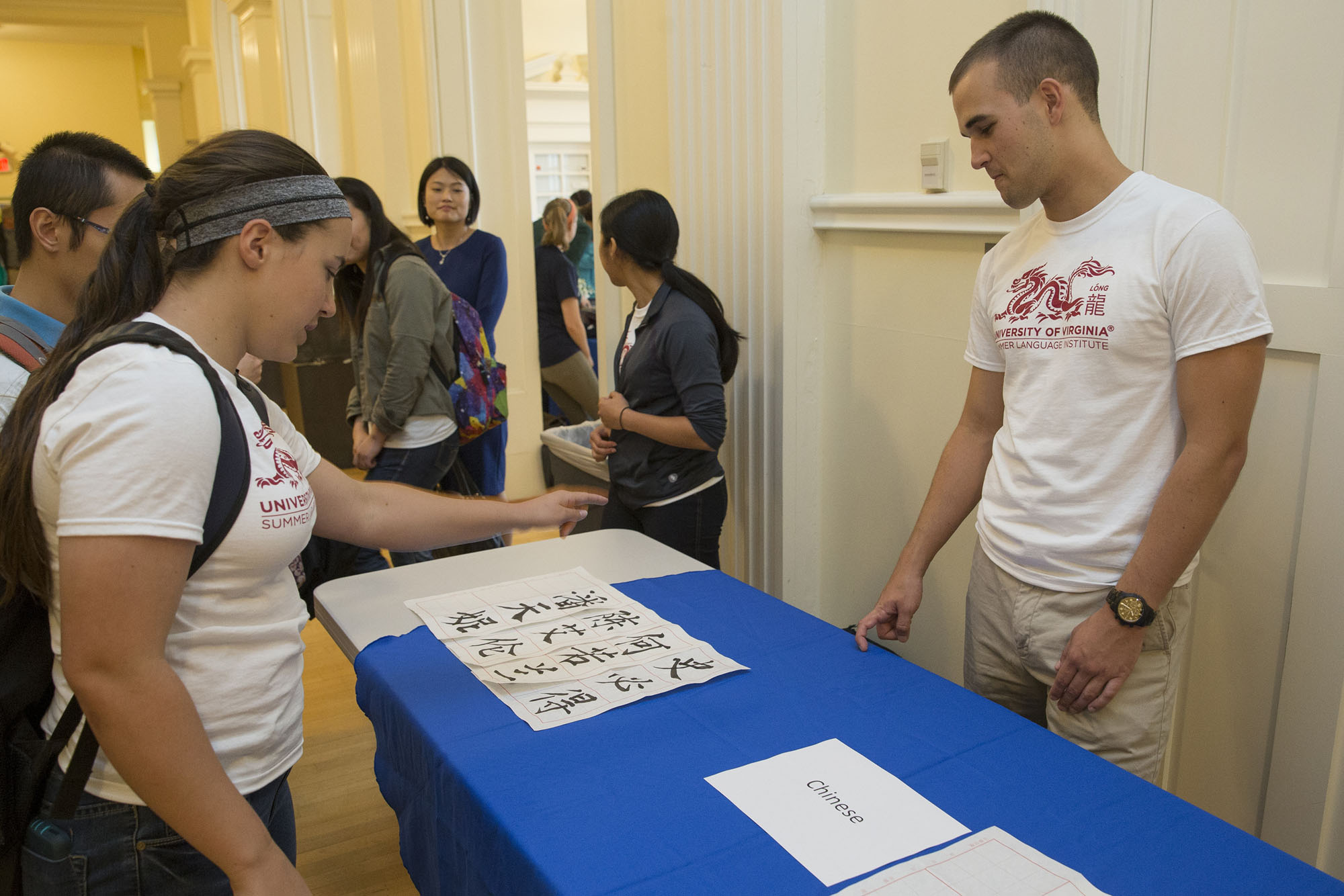The key to a culture is its language, which is why some ROTC cadets spend their summer mastering foreign tongues.
Eight University of Virginia ROTC students are devoting their summer to learning new languages, both on Grounds and in foreign countries, through the federally funded Project GO.
A program of the U.S. Department of Defense, Project GO is in its seventh year at the University, helping ROTC students learn what the government refers to as “critical languages” such as Russian, Arabic, Chinese and Urdu. The U.Va. cadets study languages at U.Va. and at other schools, while eight cadets from other schools are studying languages at U.Va.
And there are also students studying in full-immersion programs overseas, including a U.Va. Army cadet who is studying Arabic in Amman, Jordan through the University of Arizona. (U.Va.’s program in Irbid, Jordan, was his first choice, but the program is suspended because of its proximity to hostilities in Syria.)
“It can be a challenge for ROTC cadets to arrange summer language classes, because they also have training obligations within their branch of service,” said Rachel Nottingham Miller, associate director of the summer and special academic programs in the summer session.
The cadets understand that expanding their language skills can enhance their careers.
“It helps with basic professional development to know a critical language,” said Gloria Williams, 21, of Charlottesville, a rising fourth-year mechanical engineering major and Air Force cadet who is studying Arabic through the U.Va. Summer Language Institute. “We are currently deployed in Arab countries. I would like to be an intelligence officer, and this helps make me a good candidate.”
“We want to have competence in a language because we can be working with people who use it as their native language,” said Kenny Baird, 22, of McKinney, Texas, who graduated from the University of Texas at Dallas with a degree in physics and is learning Russian in the Summer Language Institute.
Baird applied to four language programs, and said U.Va. was his first choice, because “the Russian program here had it together,” and he wanted to see “this side of America.”
“It’s more laid-back here than it is in northern Texas,” he said.
“Knowing another language can help you do your job to the best of your ability,” said Air Force Cadet Grey Davenport, 19, of Newport News, a third-year math and Russian double major at U.Va. “It also helps to have a cultural awareness of the people you are working with.”
He said he appreciates the academic rigor of the Summer Language Institute.
“Our teacher has been teaching Russian for 40 years,” said Army Cadet Colby Pedrick, 20, of Denver, a geography major from the University of Colorado at Denver. “U.Va. is known for things like this.”
Pedrick, who also wants to work in intelligence, said he found the program challenging, but he also enjoys the people, the food and the Charlottesville nightlife.
The intensive on-Grounds language program traditionally includes both morning and afternoon classes, plus tutoring sessions, exploring the language in depth.
“The standard is to read, write, listen and speak, with a cultural component to get it in context,” Miller said.
Students sometimes go to an Asian or a Russian grocery store to shop for foodstuffs in the intended language, or watch foreign movies or attend activities at the International Center, she said.
“The Arabic group will perform a play in traditional Arabic shadow theater,” Miller said, “and the Chinese students will have lunch with native Chinese speakers, either cooking a meal together or going to a restaurant.”
Cadets interested in critical languages apply to programs at various schools using scholarships funded by Project GO.
“Project GO offers a unique opportunity for ROTC cadets to immerse themselves in a foreign nation, language and culture,” said Col. Steven T. Hiss, commander of U.Va.’s Air Force ROTC detachment. “In today’s expeditionary environment, it’s critical our Air Force officers understand how nations and people interact, and to be able to look at issues from varying perspectives.
“Project GO provides my cadets the ability to communicate with a broader range of people and is an excellent opportunity for them to enhance their cross-cultural communications skills.”
Miller said the cadets, because of their drive and discipline, make good students.
“All of them are very smart and well-prepared and they work hard,” Miller said of the ROTC students. “I enjoy working with them.”
Media Contact
Article Information
August 10, 2015
/content/intensive-summer-language-study-pays-rotc-cadets-and-military

